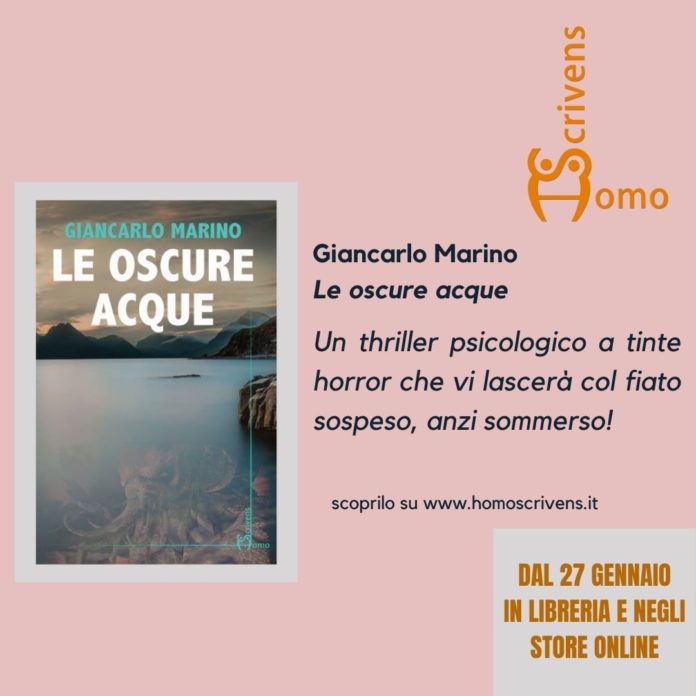Una botanica e una geologa accomunate da un progetto di ricerca internazionale si ritrovano in Ecuador per una serie di indagini presso i bacini vulcanici locali, al fine di conseguire un dottorato di ricerca. Due mesi di avventura in terra ecuadoregna con il sapore di un giallo accattivante. Di questo argomenta il libro dal titolo: Le oscure acque di Giancarlo Marino, Editore Homo Scrivens, pagg. 153, Euro 14,00.
Dopo un tormentato viaggio in bus, per coprire l’ultimo tratto prima di arrivare alla diga, finalmente Rachele e Carla giungono sul posto. Tra mille peripezie ambientali, e non poco imbarazzate dalla natura e dal clima apparentemente ostico, le due ricercatrici si ritrovano in una “fiesta”; tra una tavolata, un braciere e una danza locale antica, ballata in cerchio.
Ma le difficoltà non tardano a venire, come quando le due donne rimangono, da sole, in mezzo al lago su una imbarcazione il cui motore si ritrova fuori gioco. Caduta in mare Carla, immediatamente Rachele mette in campo diversi tentativi per disincagliarla da quell’acqua torbida che nasconde qualcosa che blocca l’amica. Alla fine arrivano a riva stanche e tramortite, senza aver capito cosa avesse trattenuto Carla sotto il pelo dell’acqua, tanto da renderla inerme e impedita.
Ritornate all’accampamento le due ricercatrici non si capacitano su cosa effettivamente fosse successo e soprattutto su cosa si nascondesse sotto la superficie del lago, di certo qualcosa di insospettato che rimaneva misterioso. Senza aver avuto neppure modo di studiare le parti di analisi interessate dell’ecosistema, all’indomani si ritrovano a dover già rientrare in città, a Cuenca. Non senza una profonda delusione per non aver potuto indagare su tutta la faccenda.
Nemmeno il tempo di arrivare al rifugio e durante le prime ore della notte, ecco rimbombare un frastuono, un frammisto di urla, mitragliate e panico generale, con tre militari che tentano di farsi consegnare una ragazza di fronte all’opposizione di alcuni ragazzi. Un chiaro episodio di una situazione generale oscura. Sullo sfondo emergelo sfruttamento dell’acqua ad opera di alcune multinazionali che hanno invaso l’equilibrio ambientale attorno al lago turbandone la sicurezza. Al punto tale che la leggenda narrante rievoca uno spirito dell’acqua dal comportamento “capriccioso”, causa di problemi e guai provocati dai cantieri.
Un libro quello di Giancarlo Marino che va letto in una sola volta, un racconto che ti incolla alle vicissitudini di Rachele e Carla, invischiate nelle turbolenze di un luogo preso di mira per essere sfruttato, con la sofferenza delle popolazioni locali. Un misto di narrazione tra fatti reali e leggende, che mette in chiaro cosa spinge i grandi colossi industriali a sfruttare terre vergini, luoghi naturali, territori larghi ed incontaminati.
L’autore fa defluire l’inchiostro senza mai mostrare il fianco alla stanchezza argomentativa, il libro mantiene il lettore sveglio, attivo, curioso di capire cosa accadrà allo scorrere delle pagine.
Verso la fine si inventa la trasposizione di 10 riassunti di altrettanti romanzi horror, una hit parade che vuole probabilmente rafforzare ancora più la trama de “Le oscure acque”. Una originalità che si inserisce bene nel contesto del libro, confezionato in maniera singolare e appassionata.
Se ne consiglia vivamente la lettura, particolarmente agli amanti di narrativa avventuriera, ai lettori che scrutano tra il sacro e il profano, a chi privilegia l’azione, a chi non disdegna sentirsi raccontare luoghi e circostanze misteriose.
©Riproduzione riservata
Homos Scrivens publisher/ “The Dark Waters” by Giancarlo Marino: a botanist and a geologist in Ecuador. Two months of adventure
A botanist and a geologist united by an international research project find themselves in Ecuador for a series of investigations at local volcanic basins in order to earn a Ph. Two months of adventure on Ecuadorian soil with the flavor of a captivating detective story. This is the subject of the book entitled: The Dark Waters by Giancarlo Marino, Publisher Homo Scrivens, pp. 153, Euro 14.00.
After a torturous bus ride to cover the last stretch before reaching the dam, Rachele and Carla finally arrive at the site. Amidst a thousand environmental vicissitudes, and not a little embarrassed by the seemingly hostile nature and climate, the two researchers end up in a “fiesta”; amidst a table, a brazier and an ancient local dance, danced in a circle.
But difficulties are not long in coming, when the two women are left, alone, in the middle of the lake on a boat whose engine finds itself out of action. Having fallen overboard Carla, immediately Rachel deploys several attempts to disengage her from the murky water that hides something blocking her friend. Eventually they arrive ashore tired and stunned, without having understood what had held Carla under the water’s surface, so much so that she was helpless and impeded.
Back at the camp, the two searchers are at a loss as to what has actually happened and especially what is hiding beneath the surface of the lake, certainly something unsuspected that remains mysterious. Without even having had a chance to study the affected portions of the ecosystem, they have to return to the city, Cuenca. Not without a deep disappointment in not being able to investigate the whole thing.
Not even time to arrive at the shelter and during the early hours of the night, there rumbles an uproar, a mixture of shouting, machine gunfire and general panic, with three soldiers attempting to get a girl handed over in the face of opposition from some boys. A clear episode in a general dark situation. In the background emerges water exploitation by some multinationals that have encroached on the environmental balance around the lake upsetting its security. To the point that the narrating legend evokes a water spirit with “capricious” behavior, the cause of problems and troubles provoked by the construction sites.
Giancarlo Marino’s is a book that must be read in one go, a tale that glues you to the vicissitudes of Rachele and Carla, caught up in the turmoil of a place targeted for exploitation, with the suffering of local people. A mixture of storytelling between real facts and legends, it makes clear what drives the big industrial giants to exploit virgin lands, natural places, wide and untouched territories.
The author gets the ink flowing without ever showing the side of argumentative fatigue; the book keeps the reader awake, active, curious about what will happen as the pages flow.
Towards the end he comes up with the transposition of 10 summaries of as many horror novels, a hit parade that is probably meant to strengthen the plot of “The Dark Waters” even more. An originality that fits well into the context of the singularly and passionately packaged book.
It is highly recommended reading, particularly for lovers of adventurous fiction, readers who peer between the sacred and the profane, those who favor action, and those who do not dislike hearing about mysterious places and circumstances.










